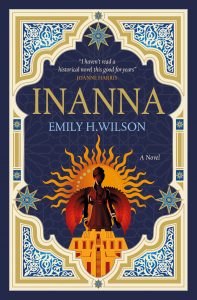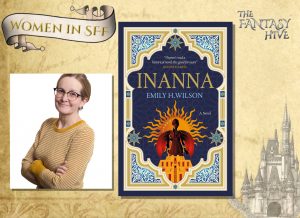Interview with Emily H. Wilson (INANNA)
Emily H. Wilson is the author of the upcoming novel Inanna. She is also the editor-in-chief of New Scientist, the world’s leading science magazine. You can read more about her at emilyhwilson.com
Welcome to the Hive, Emily. Let’s start with the basics: tell us about Inanna – why should readers check it out?
Inanna is an epic adventure set in the world’s first civilisation, Sumer, in about 4000BC, in the days when the gods still walked the Earth. The novel is a retelling of not only the Epic of Gilgamesh but also the most famous myths about Inanna, the Sumerian goddess of love and war. It’s the first part of a trilogy called The Sumerians.
What drew you to write a retelling of the Epic of Gilgamesh and the Goddess Inanna’s story?
Inanna caught my eye while I was re-reading the Gilgamesh epic just before the pandemic; she’s a bit-part player in his big story, but hugely charismatic. When I went off to research Inanna, I realised she’s actually the longest-lived female deity in existence. She was worshipped for at least 4,500 years but maybe much longer, although she was called different names (Ishtar/Aphrodite/etc) over the millennia. I realised Inanna deserved an epic of her own. So I set out to write it.
Give us an insight into your characters, who can we expect to meet?
I have three main characters.
Inanna, daughter of the moon gods, is very young in the first part of the novel; she’s only about 12 when her story really gets going. She’s still working out who she wants to be as a woman, and she’s still trying to work out how she can take some power for herself in a world where she seems to have no say over, for example, where she lives or who she is to marry.
Ninshubar grew up in a tribe of hunger-gatherers in a land far from the Sumerian city states. She is very sure of herself. Very competent. A quick thinker, a good fighter, a superb hunter, a fine judge of character … really she is someone who is excellent at all things. Ninshubar has a high opinion of herself, but then, with good reason.
Finally there’s Gilgamesh, the mortal son of two gods. At one point in the story, Enlil, lord of the sky gods, says to Gilgamesh: “You are dissolute, Gilgamesh. You would try to sleep with me if you were drunk enough. With a donkey. With every girl in this city. I know what you are, Gilgamesh.”
Enlil is right about all of that. But I ended up loving Gilgamesh anyway. I hope he is at least a lot of fun.
Do you have a favourite deity? Other than Inanna, of course?
I have a lot of respect for Enlil (mentioned above) and his sense of deep commitment to his family. Enki, the lord of wisdom, is a nasty piece of work, but he is fun to write. I do really like Gilgamesh’s mother, Ninsun, but you have to wait for book two to meet her.
By the way, when I talk about liking these deities, I mean I like them as they now are in my novels. I’m not sure you would be able to draw much of a view on someone like Ninsun, goddess of cows, from the original myths. Maybe that’s wrong, but a lot of the Sumerian myths are fragmentary.

If you were transported into Inanna’s ancient Mesopotamian world, how do you think you would fare?
I would fare badly. I would love to see the Euphrates as it once was, and the great city of Uruk at its peak, but I think that I myself would die of mosquito bites and sunburn fairly quickly. I’d love to be a Ninshubar, able to survive anywhere, but I’m not. Of course if I was an Anunnaki goddess, like Inanna, with the ability to heal very quickly and live for a very long time indeed, then I might do rather better.
Are there any other Sumerian myths you would like to write about in future?
In books two and three of the trilogy I rove more heavily into the myths involving other gods and goddesses in the Sumerian pantheon but I better not say too much.
We always appreciate a beautiful book cover! How involved in the process were you?
I was not involved other than right at the end when my editor at Titan showed me four options, I think, and I had a very strong preference for the one we used. Fortunately my editor agreed! It reminds me of the cover of my copy of Octavia E. Butler’s Wildseed.
Was there a particular aesthetic you hoped the artist would portray?
I don’t know how Julia Lloyd, the artist, came up with the cover. But it is very clever, incorporating a lot of stuff from Ancient Sumer as well as being extremely gorgeous. I really couldn’t have hoped for anything better.
Just for fun, how would you pitch your book as a 1-star review?
Too many characters, too many weird, foreign-sounding names. Also, why can’t it make up its mind if it’s fantasy, historical fiction or sci fi?
Inanna is the first book of a trilogy, can you give us any teasers for book two?
Book two centres around a terrible crime, and a vengeance that stretches between realms and across deep time … but it’s got all the old gang in it, plus some big new characters. The whole trilogy is really one big, seamless story.
Who are the most significant women in SFF who have shaped and influenced your work?
I absolutely love Mary Renault and I am certainly influenced by her. I would be honoured to ever create anything a billionth as good as her Theseus or Alexander books.
By the way, I should say that I had just read Madeline Miller’s Circe when I decided to give Inanna her own epic. I don’t think I would have had the idea for my novel without Circe fresh in my mind. In fact, initially, I envisaged my book as Circe x Game of Thrones, and actually, that’s not a terrible description for how it turned out.
Who is a great woman in SFF who we should be reading?
I really liked Ann Leckie’s Ancillary Justice. How I would love to write a sci-fi as good as that. I haven’t read her latest yet from that universe (Translation State) but it’s at the top of my holiday reading list.
Any hidden gems?
I always think Doris Lessing’s Canopus in Argos series is somehow something of a hidden gem, despite her literary fame. I think her swerve out into scifi was a really interesting one because (for me at least) it felt very much part of her core canon, while at the same time being a wild departure.
Finally, what is the one thing you hope readers take away from your writing?
My dream for my novel was that it would be a delightful garden that people would want to come and spend time in, and maybe even visit more than once. That’s it!
Thank you so much for joining us for Women in SFF
Inanna is due for release on 1st August from Titan Books.
You can pre-order your copy from Bookshop.org

